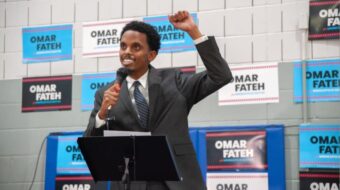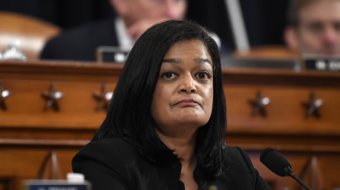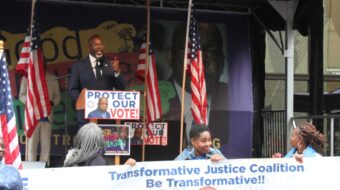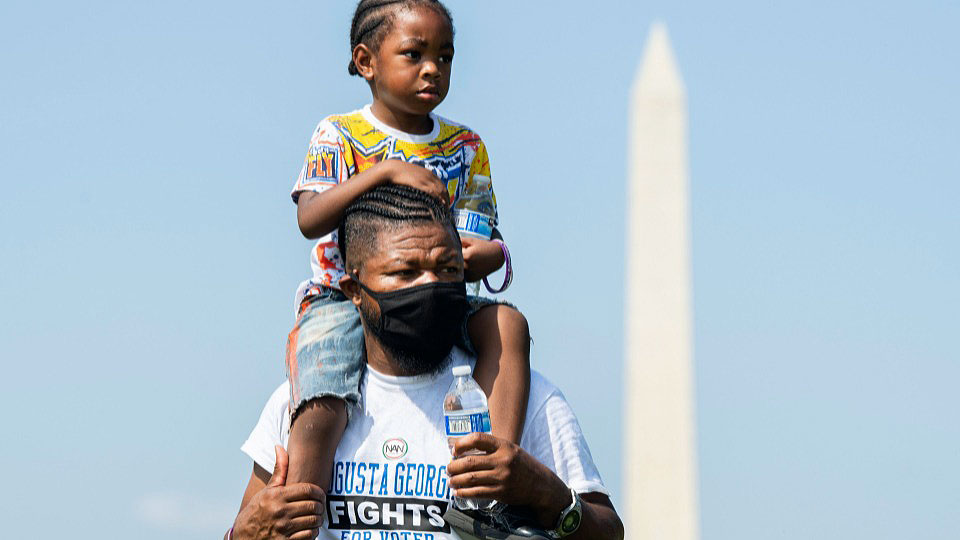
Join the fight for voting rights. Text the word PLEDGE to 89799 on your mobile phone.
WASHINGTON—From Anchorage to Washington, masses of people marched again on Aug. 28—the anniversary of the 1963 March on Washington—for one of the same causes of that long-ago day, voting rights.
Tens of thousands, most prominently a crowd augmented by union members, progressives, and the Communist Party USA, paraded from D.C.’s McPherson Square past the White House and the new National Museum of African-American History down to the National Mall, where they heard speeches from march organizer the Rev. Al Sharpton, several lawmakers, and the sons and granddaughter of the Rev. Dr. Martin Luther King, Jr.
Other marchers headed for a second rally at the Lincoln Memorial, site of the 1963 March for Jobs and Justice.
None of the speakers rose to the heights of King’s eloquence there on Aug. 28, 1963, but all made the same point: That it is time to rise up to once again protect and expand the right to vote.
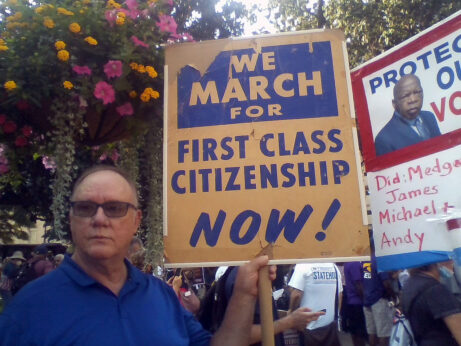
“My mother Ursula was at the 1963 march,” said Virginian Jim Davey, holding a sign from that protest, which drew some 250,000 people. “The sad part is I have to do it again.”
The marchers’ objective: To force Congress, and specifically the evenly split U.S. Senate, to pass the John Lewis Voting Rights Advancement Act and the For the People Act, two House-approved measures that would strengthen voting rights from coast to coast.
The Lewis Act, named for the late civil rights veteran, King ally in 1963, and longtime congressman from Atlanta, would restore the power of the federal government—taken away by the GOP-named U.S. Supreme Court majority—to stop voter repression even before it begins.
It would do so by mandating that governments with a history of discrimination must preclear any voting changes, from state laws to closing polling places, with the federal government or federal judges.
And that coverage would extend beyond the historically discriminatory South, under a new formula based on voting patterns in areas with people of color or past discrimination.
The For the People Act aims to restore power to people, and away from corporations, in politics. It would mandate disclosure of “dark money” campaign funding sources, ease the way for same-day voter registration, mail-in, and pre-election balloting, make Election Day a holiday, and, most importantly, override repressive voting laws GOP-run states have rushed to enact, especially this year.
“John Lewis’s work is still unfinished, and my father’s dream is still unrealized, and so today we march for the John Lewis VRAA and the For the People Act,” Martin Luther King, III, the famed leader’s son, told the crowd in D.C.
“Without voting rights for all, there is democracy for none,” he said.
“In Atlanta, there is an eternal flame that burns for Martin Luther King Jr. and Coretta Scott King, and I sometimes think about how fire is one of the most powerful forces in this world,” added Dr. King’s granddaughter, Andrea.
“It doesn’t matter what side of the aisle you’re on” politically, said Lewis’s younger brother Henry. “It’s more important to be on the right side of history.”
“It’s a certain sadness we have to fight over the American people getting access to the ballot,” said the Rev. William Barber II, co-chair of the new Poor People’s Campaign, modeled on another 1968 Martin Luther King-planned protest. King was murdered before it occurred.
“This is not Jim Crow, this is James Crow, Esquire,” Barber said, citing legal barriers to voting rights.
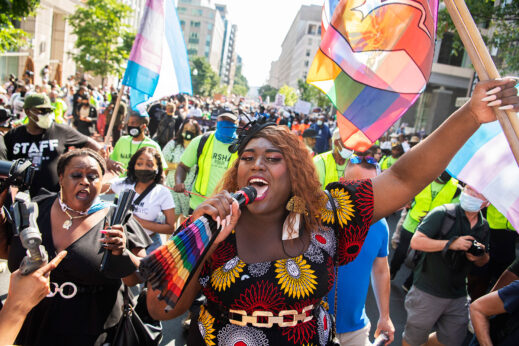
Like several other speakers and participants, Barber also stressed other civil rights-related causes, including the right to organize and the battle for a $15 federal minimum wage. In D.C., statehood for its almost 700,000 residents was added to the list. The nation’s capital is 41% Black, 40% white, and 15% Hispanic, 2020 census data show.
All the measures speakers mentioned, like the Lewis Act and the For the People Act, face hardline Republican opposition, based on race and class, as well as Senate GOP filibuster threats. That led to another demand: Eliminate the filibuster, with its racist origins.
“Racism cost us not just our votes. It cost us our wealth. It cost us our health, as this coronavirus pandemic struck us disproportionately. It cost us our lives,” declared Damon Hewitt, CEO of the Lawyers Committee for Civil Rights Under Law.
The racism behind repression also led Sharpton to tell the D.C. crowd the mass marches there—and in Atlanta, Phoenix, Miami, San Antonio, Fort Worth, Chicago and its suburb of Elk Grove Village, Ocala, Fla., Dayton, Ohio, Boston, Palo Alto and Hayward, Calif., Sauk City and Iowa City, Iowa, and elsewhere—are just the start of the latest round of voting rights pressure.
The marches will be followed by “a massive digital action to get thousands of more people to pledged to protect voting rights,” he said. He urged marchers to text the word PLEDGE to 89799 on their cell phones.
And Rep. Sheila Jackson Lee, D-Calif., challenged the crowds not just to march, but to act. “Are you merely a member of the movement, or are you ready to move that movement forward?” she asked.
“Protecting our right to vote has been about the desire of a small group of people to keep power away from the rest of us,” speaker Alicia Garza of Black Lives Matter told the crowd.
Marchers themselves sounded the same theme, even if they came from states where voting rights are not under attack. A busload of 40 members of Service Employees Local 73, almost all of them Black, and mostly women, traveled overnight from Chicago to march, even though Illinois, a “blue” state, has vastly eased voting restrictions.
Other unions at the march included the Communications Workers, the AFL-CIO, Working America, the Teachers (AFT), SEIU Local 722, and SEIU1199, the nationwide health care union.
“We’re an island of blue in a sea of red,” one Local 73 woman told People’s World, citing the Republican-governed states around the Land of Lincoln, specifically Missouri, Indiana—where the case involving the Supreme Court’s first “voter ID” decision originated—and especially Iowa.
The GOP-dominated Iowa legislature has been busy making the path to the polls harder, especially for people of color. That pattern disgusted several Iowans on the march, who are already planning to campaign next year against state lawmakers, the GOP governor, and longtime Republican Sen. Charles Grassley, a foe of the legislation.
Also around Illinois: Red-run Wisconsin, where the gerrymandered GOP-dominated legislature has overridden Democratic Gov. Tony Evers’ vetoes of voter restrictions, and Kentucky. The Bluegrass State is so Republican now that its legislative majority actually eased repression—because doing so would benefit them.
Her comments were echoed by speakers in the Hawkeye State, on a Facebook video. “Voting should be as easy and as accessible as possible,” said one at the Iowa City podium.
“Hopefully this will inspire people to register and vote. This is the only way we can beat them,” added Montserrat Garibay, a member of Texas’s joint AFT-NEA affiliate who left a post as Secretary-Treasurer of the Texas AFL-CIO to take a senior U.S. Education Department post in D.C.
Her home state has also been a focus for GOP voter repression. Two days before the march, its ruling Republicans, having finally threatened or dragged enough state House Democrats back to Austin to make a quorum and end a boycott, forced through SB1, making the Lone Star State’s voting repression even tougher.
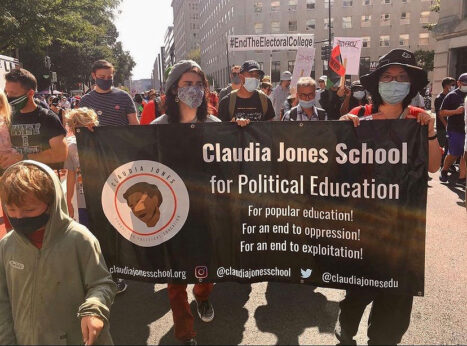
As the Iowa and Wisconsin examples showed, voter repression isn’t confined to Dixie. A Young Communist League member from Philadelphia made that point too in informal conversation while marching alongside two colleagues from Virginia—one of whom pushed the other in a wheelchair. They wore red Industrial Workers of the World t-shirts.
The Virginians reported another group of CPUSA members, coming from New York by train, had been delayed and were unable to reach the start of the march on time. But the march and speeches lasted most of the day, giving them a chance to catch up.
When he returned to Philadelphia, the young man said, he and his colleagues will have their work cut out for them. A GOP majority on a special Pennsylvania Senate committee is campaigning for a “recount” of ballots, particularly in majority-minority Philadelphia and its suburbs, that gave Democratic nominee Joe Biden his 80,155-vote Keystone State win over GOP Oval Office occupant Donald Trump.
Trump’s big lies about the “stolen election,” especially in swing states such as Arizona—home to a farcical recount of ballots from dominant Maricopa County—Pennsylvania, Wisconsin, and Michigan, have fueled the fire of repressive legislation.
But one big black-and-yellow banner summed up what the marchers want from Congress, but also from the country:
“This is a democracy,” it declared. “Act like it!”



